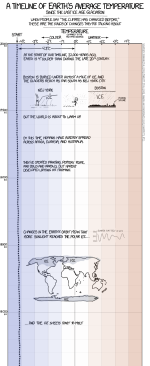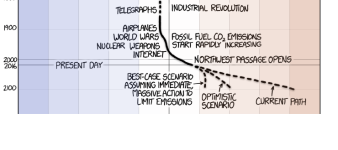I didn't know there were teams. Teams implies a decision regardless of evidence.
I don't believe that the computer models used by "climate scientists" are correct. I do believe in following the evidence wherever it leads.
In other words, you choose to listen to the ones that say what you want to hear, not the ones who can support their position.
More like a confirmation bias. I know my shit about computer models. M'speciality. Any report which bases its conclusions on a prediction by a computer, skeptical about it I am. A computer projection is an extraordinary claim. The model must, for example, when run on the data from ancient history through 1999, accurately predict the next decade through 2009 and do a creditable job through 2019. It must work when the data through 1934 or 1964 is input. This is the falsifiability criterion for computer models.
In the past climate shifts have occurred without the aid or hindrance of mankind. Now we are generating some man-made warming which is to be added to the ordinary variability. The question on the floor is not 'whether' but 'how big.' If the effect is small as a percentage of other variability perhaps there is no need to rush. As I recall the projection is +1 K in a century. Yes, this is actually fairly large. A drop of a similar amount led to the Mini Ice Age. But only half of that in 50 years.
One way to fix the problem is to reframe it. The problem is about generating power. If there were a solution that solves the clean power generation problem I would imagine virtually universal support. I believe that Thorium salt (Gen4) reactors may well be large part of a solution. They eat Gen3 waste for fuel and they do not pollute the air. Nor do they put CO2 into the air.
If we implement this and the weather warms anyway, we can at least make air-conditioned caves. And perhaps settle Antarctica. If the weather stays more or less the same the next century we still get the benefit of cheaper electric power. If the weather gets cooler -- a grand solar minimum, or a volcano due to our magnetic pole shift, or whatever -- Gen4 provides the power for cheap electric heat. Win-win-win.
Or a network of satellites which collect solar energy and beam it down as microwaves. The solar collectors would be huge, making shadows -- cooling shadows (only good if only warming can possibly be).
Another big red flag for me is "settled science." There is well-tested science and young science. Climate theories, being young and all, must wait for centuries to become mature well-tested science. Climate changes are slow. "Sudden" in paleontology is a few thousand years. "Sudden" in climatology must surely be similar. This adds to the wait.









